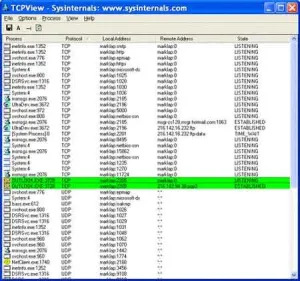

TCP's design requires incoming data to be processed as part of the initializing handshake. This ability permits your computer to have multiple conversations, with different pieces of software running on the system, and send incoming data to the correct conversation.

When the TCP/IP stack (responsible for common protocols, including TCP and UDP and perhaps ICMP) receives information, it sends that information to programs. (Specifically, the networking stack must know this.) The process IDs are just unknown to netstat.ĭoesn't the system know the path of any process that establishes a connection? 1.How is it possible that processes have unknown paths?


 0 kommentar(er)
0 kommentar(er)
